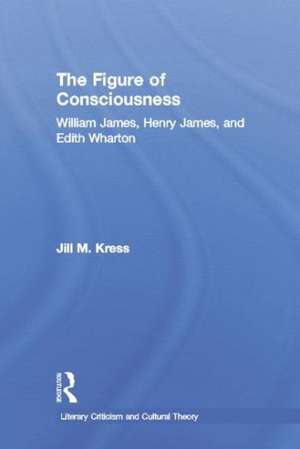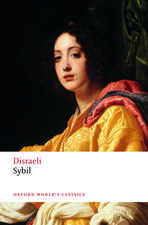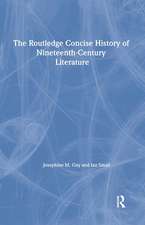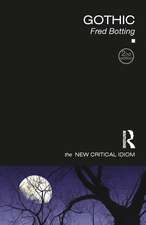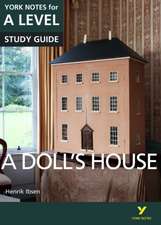The Figure of Consciousness: William James, Henry James and Edith Wharton: Literary Criticism and Cultural Theory
Autor Jill M. Kressen Limba Engleză Paperback – 11 sep 2014
| Toate formatele și edițiile | Preț | Express |
|---|---|---|
| Paperback (1) | 447.51 lei 6-8 săpt. | |
| Taylor & Francis – 11 sep 2014 | 447.51 lei 6-8 săpt. | |
| Hardback (1) | 1002.36 lei 6-8 săpt. | |
| Taylor & Francis – 14 iun 2002 | 1002.36 lei 6-8 săpt. |
Din seria Literary Criticism and Cultural Theory
- 9%
 Preț: 934.49 lei
Preț: 934.49 lei - 9%
 Preț: 1038.37 lei
Preț: 1038.37 lei -
 Preț: 309.89 lei
Preț: 309.89 lei - 18%
 Preț: 1053.16 lei
Preț: 1053.16 lei - 18%
 Preț: 999.02 lei
Preț: 999.02 lei - 18%
 Preț: 1005.39 lei
Preț: 1005.39 lei - 18%
 Preț: 1102.88 lei
Preț: 1102.88 lei - 18%
 Preț: 1054.58 lei
Preț: 1054.58 lei - 18%
 Preț: 998.71 lei
Preț: 998.71 lei - 18%
 Preț: 701.56 lei
Preț: 701.56 lei - 18%
 Preț: 1109.78 lei
Preț: 1109.78 lei - 18%
 Preț: 1054.61 lei
Preț: 1054.61 lei - 18%
 Preț: 1056.80 lei
Preț: 1056.80 lei - 18%
 Preț: 1051.55 lei
Preț: 1051.55 lei - 15%
 Preț: 697.34 lei
Preț: 697.34 lei - 18%
 Preț: 1050.16 lei
Preț: 1050.16 lei - 18%
 Preț: 998.08 lei
Preț: 998.08 lei - 26%
 Preț: 819.09 lei
Preț: 819.09 lei - 31%
 Preț: 763.55 lei
Preț: 763.55 lei - 18%
 Preț: 997.45 lei
Preț: 997.45 lei - 18%
 Preț: 998.26 lei
Preț: 998.26 lei - 28%
 Preț: 490.08 lei
Preț: 490.08 lei - 18%
 Preț: 998.88 lei
Preț: 998.88 lei - 18%
 Preț: 1109.18 lei
Preț: 1109.18 lei - 18%
 Preț: 1105.24 lei
Preț: 1105.24 lei - 31%
 Preț: 763.64 lei
Preț: 763.64 lei - 18%
 Preț: 1000.61 lei
Preț: 1000.61 lei - 18%
 Preț: 999.82 lei
Preț: 999.82 lei - 28%
 Preț: 819.48 lei
Preț: 819.48 lei - 26%
 Preț: 763.78 lei
Preț: 763.78 lei - 18%
 Preț: 779.28 lei
Preț: 779.28 lei - 17%
 Preț: 245.56 lei
Preț: 245.56 lei - 18%
 Preț: 1106.81 lei
Preț: 1106.81 lei - 18%
 Preț: 998.56 lei
Preț: 998.56 lei - 28%
 Preț: 874.84 lei
Preț: 874.84 lei - 18%
 Preț: 995.70 lei
Preț: 995.70 lei - 26%
 Preț: 819.09 lei
Preț: 819.09 lei - 15%
 Preț: 673.44 lei
Preț: 673.44 lei -
 Preț: 365.54 lei
Preț: 365.54 lei - 18%
 Preț: 1052.35 lei
Preț: 1052.35 lei - 18%
 Preț: 1057.05 lei
Preț: 1057.05 lei - 18%
 Preț: 944.11 lei
Preț: 944.11 lei - 18%
 Preț: 1056.28 lei
Preț: 1056.28 lei - 31%
 Preț: 763.39 lei
Preț: 763.39 lei - 26%
 Preț: 819.09 lei
Preț: 819.09 lei - 31%
 Preț: 766.66 lei
Preț: 766.66 lei - 18%
 Preț: 997.45 lei
Preț: 997.45 lei - 26%
 Preț: 820.32 lei
Preț: 820.32 lei - 18%
 Preț: 731.71 lei
Preț: 731.71 lei - 18%
 Preț: 1002.36 lei
Preț: 1002.36 lei
Preț: 447.51 lei
Nou
Puncte Express: 671
Preț estimativ în valută:
85.64€ • 90.05$ • 70.76£
85.64€ • 90.05$ • 70.76£
Carte tipărită la comandă
Livrare economică 16-30 aprilie
Preluare comenzi: 021 569.72.76
Specificații
ISBN-13: 9780415864985
ISBN-10: 0415864984
Pagini: 288
Dimensiuni: 152 x 229 x 18 mm
Greutate: 0.41 kg
Ediția:1
Editura: Taylor & Francis
Colecția Routledge
Seria Literary Criticism and Cultural Theory
Locul publicării:Oxford, United Kingdom
ISBN-10: 0415864984
Pagini: 288
Dimensiuni: 152 x 229 x 18 mm
Greutate: 0.41 kg
Ediția:1
Editura: Taylor & Francis
Colecția Routledge
Seria Literary Criticism and Cultural Theory
Locul publicării:Oxford, United Kingdom
Notă biografică
Jill M. Kress earned her Ph.D. (1998) from the University of Rochester. Currently she teaches American literature and writing at St. John Fisher College. Her work has appeared in The Journal of the History of Ideas and Salamander.
Cuprins
Chapter 1 Studies in Nature and Interiors: The Discourse of Consciousness in Nineteenth-Century Science; Chapter 2 Contesting Metaphors and the Discourse of Consciousness in William James; Chapter 3 The Structure of Consciousness: Henry James's Portrait of a Lady and the Drama of Social Relations; Chapter 4 Relations, Receptacles and Worlds of Experience: Gendered Metaphors and The Golden Bowl; Chapter 5 Designing Our Interiors: Self-Consciousness and Social Awareness in Edith Wharton's The House of Mirth; Chapter 6 The Price of a Conscious Self in Edith Wharton's The Age of Innocence;
